Thousands of people yesterday rallied outside the Legislative Yuan in Taipei, demanding that the Hong Kong government withdraw its controversial extradition bill and release protesters arrested in connection with demonstrations in the territory last week.
The rally organized by Hong Kong students, the Taiwan Citizen Front and the Taiwan Youth Association for Democracy (TYAD), drew more than 10,000 people despite scorching heat, organizers said.
Although Hong Kong Chief Executive Carrie Lam (林鄭月娥) on Saturday said that the reviews of the bill in Hong Kong’s Legislative Council would be suspended, it was not withdrawn, said TYAD member Michelle Wu (吳奕柔), who is also president of the National Taiwan University Student Association.
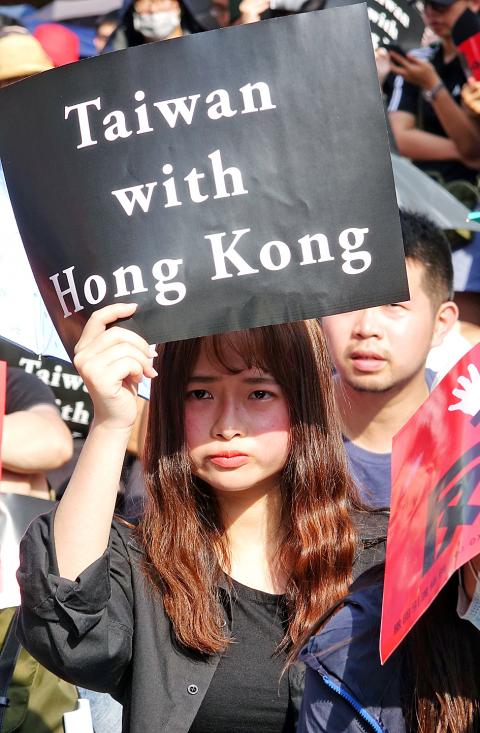
Photo: Fang Pin-chao, Taipei Times
If passed, the bill would allow anyone arrested in Hong Kong to be extradited to mainland China for trial, subjecting them to that nation’s notoriously opaque judicial system, she said.
“We urge Carrie Lam to immediately promise to withdraw the bill, take responsibility for the violent crackdowns that escalated clashes between police and protesters, stop persecution of protesters, cease unwarranted searches and thoroughly investigate officers involved in police violence,” Wu said.
Hong Kong’s experience should serve as a warning for Taiwanese, proving that Beijing’s “one country, two systems” arrangement cannot be trusted, said Hong Kong Independence Union convener Wayne Chan (陳家駒), who was arrested in Hong Kong on Sunday last week for joining protests against the bill and released on bail the following day.
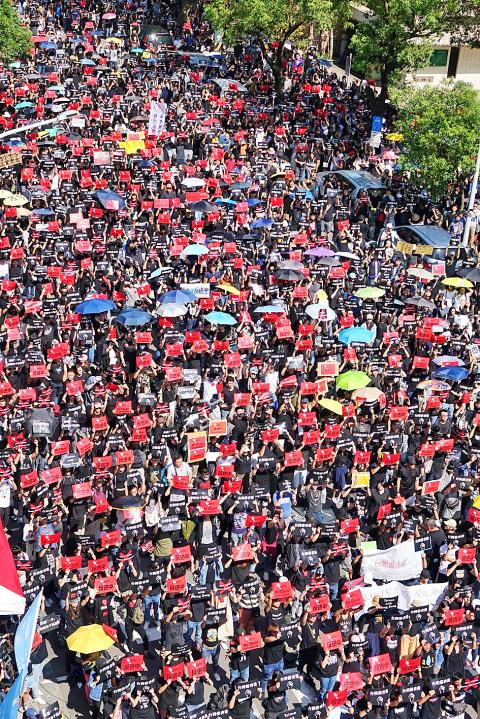
Photo: Liu Hsin-de, Taipei Times
He used to believe that the arrangement would protect Hong Kongers’ freedom, ensure democracy and the rule of the law in the territory, he said.
“However, today we cannot even speak out loud the truth we believe in, or express our expectations for Hong Kong’s future,” he said.
He will soon return to Hong Kong to face investigation from the authoritarian government, he said.
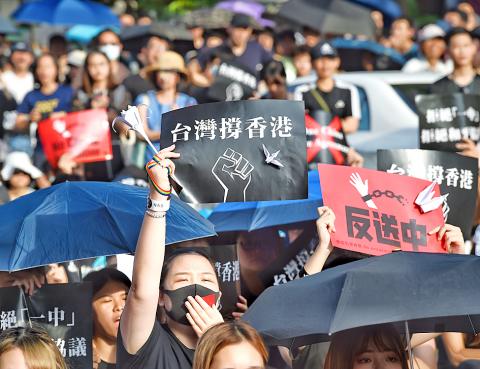
Photo: Fang Pin-chao, Taipei Times
“I do not know whether the government would again shoot and arrest people for going on strike, but we Hong Kongers will fight to the end no matter what,” he said.
Taiwan and Hong Kong must stand in solidarity in their fight against Beijing, both being victims of China’s imperialism, said Wu Ruei-ren (吳叡人), an associate research fellow at Academia Sinica Institute of Taiwan History.
China expands its authoritarianism by promoting the “one country, two systems” framework, which is in reality a form of imperialism and colonialism, he said, adding: “Hong Kong deserves a second chance to realize self-determination.”
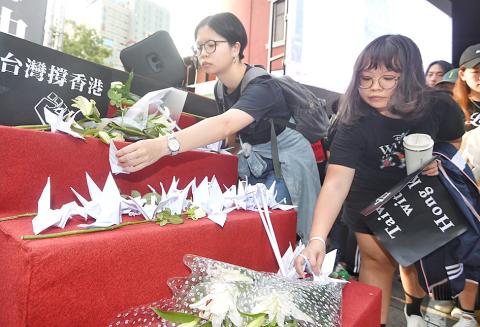
Photo: Fang Pin-chao, Taipei Times
The Taipei rally, which began at 2pm, lasted more than three hours before ending with people placing white flowers and paper cranes in front of a stage on Jinan Road to condemn police violence against the protesters in Hong Kong and offer condolences for a Hong Kong man who died on Saturday after falling from scaffolding in the Admiralty district after he hung a banner opposing the extradition bill.
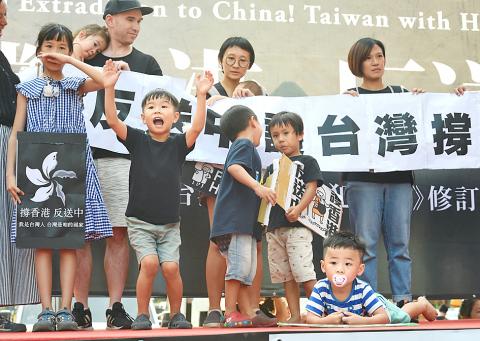
Photo: Fang Pin-chao, Taipei Times

MAKING WAVES: China’s maritime militia could become a nontraditional threat in war, clogging up shipping lanes to prevent US or Japanese intervention, a report said About 1,900 Chinese ships flying flags of convenience and fishing vessels that participated in China’s military exercises around Taiwan last month and in January have been listed for monitoring, Coast Guard Administration (CGA) Deputy Director-General Hsieh Ching-chin (謝慶欽) said yesterday. Following amendments to the Commercial Port Act (商港法) and the Law of Ships (船舶法) last month, the CGA can designate possible berthing areas or deny ports of call for vessels suspected of loitering around areas where undersea cables can be accessed, Oceans Affairs Council Minister Kuan Bi-ling (管碧玲) said. The list of suspected ships, originally 300, had risen to about 1,900 as

Right-wing political scientist Laura Fernandez on Sunday won Costa Rica’s presidential election by a landslide, after promising to crack down on rising violence linked to the cocaine trade. Fernandez’s nearest rival, economist Alvaro Ramos, conceded defeat as results showed the ruling party far exceeding the threshold of 40 percent needed to avoid a runoff. With 94 percent of polling stations counted, the political heir of outgoing Costa Rican President Rodrigo Chaves had captured 48.3 percent of the vote compared with Ramos’ 33.4 percent, the Supreme Electoral Tribunal said. As soon as the first results were announced, members of Fernandez’s Sovereign People’s Party

MORE RESPONSIBILITY: Draftees would be expected to fight alongside professional soldiers, likely requiring the transformation of some training brigades into combat units The armed forces are to start incorporating new conscripts into combined arms brigades this year to enhance combat readiness, the Executive Yuan’s latest policy report said. The new policy would affect Taiwanese men entering the military for their compulsory service, which was extended to one year under reforms by then-president Tsai Ing-wen (蔡英文) in 2022. The conscripts would be trained to operate machine guns, uncrewed aerial vehicles, anti-tank guided missile launchers and Stinger air defense systems, the report said, adding that the basic training would be lengthened to eight weeks. After basic training, conscripts would be sorted into infantry battalions that would take

GROWING AMBITIONS: The scale and tempo of the operations show that the Strait has become the core theater for China to expand its security interests, the report said Chinese military aircraft incursions around Taiwan have surged nearly 15-fold over the past five years, according to a report released yesterday by the Democratic Progressive Party’s (DPP) Department of China Affairs. Sorties in the Taiwan Strait were previously irregular, totaling 380 in 2020, but have since evolved into routine operations, the report showed. “This demonstrates that the Taiwan Strait has become both the starting point and testing ground for Beijing’s expansionist ambitions,” it said. Driven by military expansionism, China is systematically pursuing actions aimed at altering the regional “status quo,” the department said, adding that Taiwan represents the most critical link in China’s